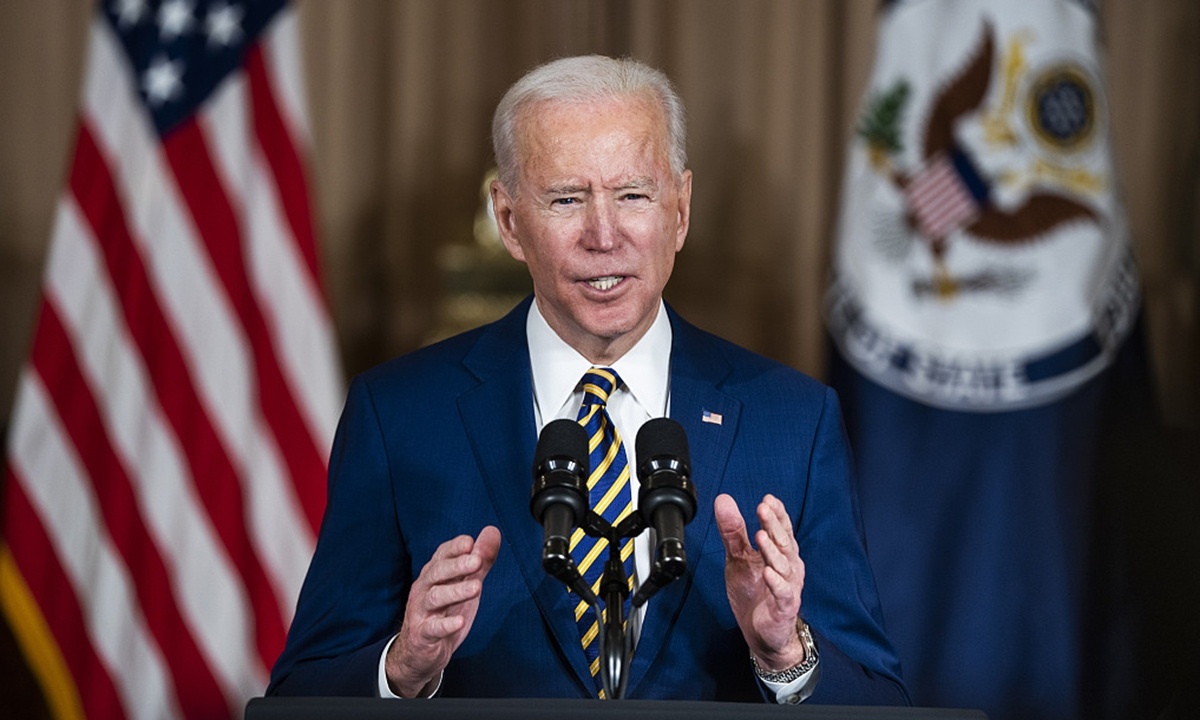
US President Joe Biden. (Photo: VCG)
US President Joe Biden predictably used his first multilateral appearances since taking office to rally support from allies to confront China, but faced a wall, as cooperation with China is inevitable for Europe to tackle the COVID-19 pandemic and other challenges and using "ideology" to glue the alliance together is losing its attraction.
In a speech to the virtual G7 summit, Biden stressed the need for US and allies to collectively deal with economic threats posed by China. At the Munich Security Conference, Biden said "We must prepare together for long-term strategic competition with China," and vowed to restart multilateralism after four years of "America first" policies.
"I know the past few years have strained and tested our transatlantic relationship, but the United States is determined - determined - to re-engage with Europe, to consult with you, to earn back our position of trusted leadership," he said. He told the virtual online audience: "America is back."
However, Biden's calls did not gain much traction among US allies in Europe. That was clear in a joint statement following the G7 meeting, which focused on tackling the real challenges stemming from the COVID-19 pandemic and economic recovery and noticeably only mentioned China once - in favorable terms.
"With the aim of supporting a fair and mutually beneficial global economic system for all people, we will engage with others, especially G20 countries including large economies such as China," the statement reads.
The leaders did say that they would consult with each other on collective approaches to address non-market oriented policies and practices, which some foreign media outlets claimed to be a reference to China.
While the statement did not directly reveal a pushback from allies against Biden's attempt to pit Europe against China, speeches by European leaders were notably straightforward in their disinterest in a confrontation.
German Chancellor Angela Merkel called for a common approach toward dealing with China but she also noted the interests between trans-Atlantic nations don't always line up.
French President Emmanuel defended European "strategic autonomy" and noted the postwar American-dominated world order needs to yield to new realities.
Chinese analysts said that Biden's message was clear and predictable and that the US wanted to mobilize Europe to contain China's development as it now lacks political resources and is mired in a flurry of domestic crises. Also clear was Europe's intention to cooperate with China given the massive mutual interests.
"We do not conceal divergences in many fields [between China and Europe], but frictions and disagreements can be solved via communication and negotiation, and cooperation is the mainstream," Li Haidong, a professor at the Institute of International Relations of China Foreign Affairs University, told the Global Times on Saturday, adding that every country will consider what is their real interests when devising foreign policies.
Apart from the huge economic and trade link between China and Europe, profound turmoil in the US domestic politics and its problematic foreign policies have also seriously chipped away allies' trust and confidence in the former leader of the West, experts said.
The uncertainty of US politics has weakened Europeans' own confidence in the former leader of the alliance, not to mention the fact that each country has their own problems to handle and is unlikely to confront an "fabricated enemy," Li said.
Also turning off European leaders was Biden's lack of a concrete plan, though his strategy largely mirrors that during former US president Barack Obama, according to analysts.
Lü Xiang, a research fellow on US studies at the Chinese Academy of Social Sciences in Beijing, said that Biden faces a delicate balance between foreign policies and domestic problems, which could be hard to navigate.
"My concern is what if Biden cannot command his team to reach a balance," Lü said, noting that Biden's diplomatic team has the danger of misjudging the overall situation and disturbing the balance.


